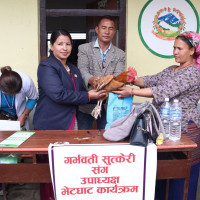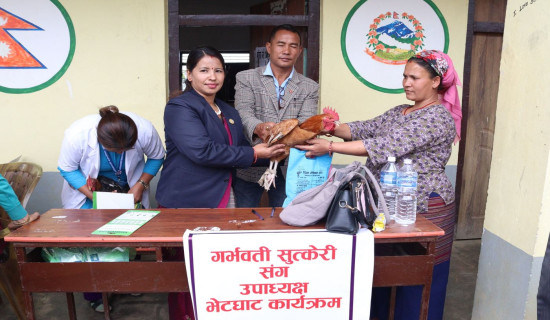- Saturday, 5 July 2025
Private schools flout regulations on admission calendar, fee structure
By Nilima Adhikari/Manjima Dhakal,Kathmandu, Mar. 30: Most private schools have been challenging the government regulations for years. Several governments in the past did try to tame the private schools, but in vain. Now when the time to admit students for new academic session is approaching, the private schools are found to be openly flouting the government rules.
The government has told schools to commence their admission in Baishak (after April 14) when the new academic session begins, but defying this directive, many private schools in the Kathmandu Valley have already finished their class one admission process. When parents enquire about enrolling their children, these schools respond that the seats are already occupied and have no seats available any more.
Additionally, there is inconsistency among schools regarding the fees charged for admission form. Parents have been dealing with this issue year after year, and the effort of the regulatory authority appears to be insufficient.
A parent, Ramesh Tiwari shared he visited a reputed school in Mid-Baneshwor on March 18 to inquire about the admission procedure to enroll his daughter in class one. To his disappointment, the school administration said that it had opened its admission form from Saraswati Puja and the had been doing so for the past two decades. The school said that they have two sections for class one with 30 children in each section and the seats are already packed.
“A few students have booked the seat depositing half the admission fee and they are taking the entrance test for St. Xavier's and St. Mary’s schools and if they get admission there, the vacant seats would be given to your child,” he quoted the school administration as saying.
As it was the nearest school the parent filled out the form paying Rs. 750, the school said that the admission committee needs to observe the child. The school provided breakfast after the observation, and when the parent asked what did the teacher ask you? The child replied, “They asked only my name and after that they made me write the answers to the questions on the paper.” After inquiring multiple times, the school said that no seats are available.
Similar complaint was heard from another parent in Mitrapark. His son was to be admitted in grade one, and he thought that as the new academic session begins in Baishak he has ample time to think about the admission. However, when he inquired in few schools near his locality he found out that the available seats for grade one were already filled. These are just representative incidents; these types of incidents are rampant in Kathamndu.
Likewise, the fee for the admission form varies widely, with some schools charging Rs. 150, while others charging Rs. 500 and in some cases even Rs. 750. The regulatory authorities have either ignored the issue or their effort to address these irregularities has been insufficient and inadequate. This has been causing a huge financial strain among parents, said Tiwari.
These activities of private schools in Kathmandu Valley have undermined government’s effort to standarise and regulate the admission process. This situation underscores the need for stronger enforcement of government mandates and more transparency in the operation of private schools.
Although the government has formulated robust rules and regulations in an effort to control such irregularity, it has not been successful in doing so. The guardians often complain that fee structures are beyond affordable.
President of Private and Boarding Schools’ Organisation, Nepal (PABSON) Krishna Prasad Adhikari said, "A few schools have done admission through lottery system. PABSON too has issued a circular advising schools to manage fees appropriately."
While talking about the fee of form, he said it is nominal. "But if any particular school is found charging excessively for the form, PABSON will not protect these schools, action should be taken to these schools in accordance with the existing laws."
"Apart from this, if the government imposes stricter regulations on fees and other matters, schools may struggle to provide quality education. So the government should also take into consideration this fact.”
The Director General of Centre for Education and Human Resource Department CEHRD Krishna Prasad Kapri said, "After the introduction of Local Government Operation Act 2074, local governments are responsible for basic and secondary education, including functions like planning, monitoring and regulating educational policies, infrastructure and arrangement of teachers.”
He further said that school education falls under the jurisdiction of local government. Earlier, there was a provision of monitoring and fee determination. “The federal government does not directly monitor the schools after this. As the local level is more responsible for the management of the schools we cannot interfere much.” However, the Education Minister has been regularly conducting meetings with the stakeholders to address these issues. And the ministry has been working to regulate this kind of irregularity, but mainly it is the duty of the local government.
Likewise, Sailendra Jha of the Kathmandu Metropolitan City Urban Planning Commission, who oversees education, said that the Kathmandu Metropolitan City issued a circular on March 18, citing rule 48 (6) of School Education Management Regulations, 2074, which prohibits schools from initiating the admission process before the academic session begins. The circular also says that the KMC has received complaints that a few schools have started their admission before the commencement of the academic session, that is Baishak. It has also directed the schools not to do so, stating that they will face consequences as per the existing laws if they do so.
He also said that despite this, a few schools are found distributing pamphlets and in certain cases, KMC has even detained the operators. Likewise, he said that a few schools were found advertising about their schools using hoarding boards and, in such cases, those hoarding boards have been removed. He further added that from next week, they are preparing to fine educational institutions that do not adhere to the rules and regulations.
Despite all these efforts, a few reputed schools are doing so in the name of open houses and parents meeting, which is not recognised by the law, he said.
Jha further added that in one way or another, guardians are also responsible for this, as they hurry to admit their children paying high fees thinking that their children might not get admission. So, to control these kinds of activities all the stakeholders including parents should act responsibly.
on the fee structure, the Metropolitan City said, "If the schools do the minuting of 75 per cent of the parents agreeing on fees the schools can take the fees. However, the KMC can monitor if the schools taking fees in the name of extra classes, and it can monitor if such classes are conducted or not."
The community schools have been improving their quality lately by introducing a book-free Friday, and smart board. The results have demonstrated that the community schools in Kathmandu have been doing well so parents have an option before rushing to private schools. Saying that the private schools are not adhering to the rules should not be spared, he said.
Kathmandu Metropolitan City has directed institutional schools within its jurisdiction to refrain from charging admission fees when students are promoted to the next grade in the same school. However, the parents often complain that they have to pay hefty amount to the school each year in the beginning of the academic year in the name of annual fee.
According to fee structure shared by RAI School, Naxal for new academic session, it charges Rs. 40,000 on the title of Annual Student Development Fee. This is only one example, all most all charges such type fees arbitrarily.
Schools claim that they are allowed to charge amount equal to two months’ fee as annual fee. It seems that the problem remains the same but the form has changed, the fee levied as an admission fee has morphed into the annual fee. The financial strain the parents feel while paying a huge amount, be it in the name of admission or annual fees, is the same. Thus stringent laws only alone not sufficient, monitoring is also equally important to curb such kinds of irregularities.
















